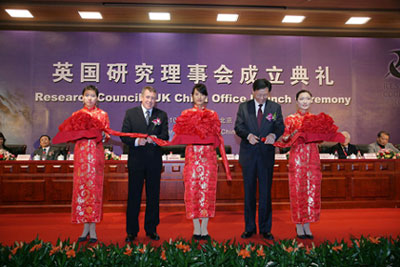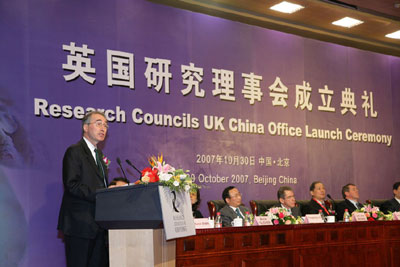|
"This is an auspicious occasion for the UK, for China, and for humanity," Sir John Sulston, 2002 Nobel Prize Winner
A major event took place last week that seemed to slip through the media's net. Which is a shame because it promises to offer so much more benefit than any 'death, disaster, sex, and celebrity' news item, that's currently making headlines.
In what is being heralded as a 'new era in the scientific and academic cooperation between the UK and China', last week in Beijing saw the opening of the Research Councils UK (RCUK) Office in China.

|
| The UK's John Denham and China's Li Xueyong cut the red tape to mark the opening of the research councils in Beijing |
Of special note it was the RCUK's first bureau outside Europe and for many commentators was a badge of honor and yet another symbol of the world's growing respect for Chinese science.
The UK's seven Research Councils according to Li Xueyong, vice-Minister of the Ministry of Science and Technology, "have a long and brilliant record in supporting scientific research and the training of talent", with many of the UK's 70-plus Science Nobel Prizes having been funded by them in previous years.
John Denham, the UK's Secretary of State for Innovation, Universities and Skills said, "It has the potential to help many more scientists and researchers think the big ideas and deliver answers to some of the world's biggest problems."
Two of the most famous cases where previous UK Research Councils have supported research include the discovery of the ozone hole in the southern hemisphere and the development of cloning technology that spawned Dolly, the sheep.
This year's 2007 Nobel laureate nicknamed the father of UK stem cell research, Sir Martin Evans was also supported throughout his career by the UK Research Councils.
At the moment major UK/China projects include research into 'carbon capture and storage to reduce emissions from power plants, a prototype pandemic influenza vaccine and a major study of how flooding risks are likely to change in China over the next few decades'.
Like bees and honey it is a good mix and in many ways has been underwriting the success of foreign companies, tertiary institutions and governments for decades now.
"The UK sees its future economic success in good science, better skills and a strong research base that works effectively with business. We believe that when we share our knowledge with Chinese scientists we are building a bright future for both our countries."
For anyone who has ever gone to the dentist or doctor in the western world, taken their dog to a vet, had the office computer system reworked or spent time on a university campus in a post graduate lounge, it would come as no surprise this recent mating of mega minds. Chinese scientists and scholars when placed alongside their global peers - when given the opportunity to work with state of the art technology and facilities - quite naturally seem to thrive.
In addition to the opening last week came two important Memorandums of Understanding between the UK and China on higher education and the Graduate Work Experience Program, which enables UK businesses to employ high quality Chinese graduates and research students on a temporary basis.
Which reminded me of my own experience at Australia's Charles Darwin University where an excellent Chinese Scientist from Xian Jiaotong had been kept on board to invigorate the GPS department. I also thought of my other friend from Qingdao who is now in England working as an architect for a large firm after having completed postgraduate studies at a Scottish University. China makes the minds and the world says "yes please".

|
| William Ehrman at the podium for the formal opening of the UK/ China research councils |
Between 2001 and 2005 UK/China scholars published more than a phenomenal 5500 jointly authored papers. Recognizing this and paying homage to the work that has been, is being and will be done, the RCUK Office will work in partnership with China's national research agencies to maximize the opportunities and challenges of international research collaboration.
For the growing pharmaceutical industry in China the recent events are great news as the UK is the world's largest exporter of pharmaceuticals. For Chinese primary school students currently doing their math homework and complaining about having to study English it is also another mighty incentive to keep on at it and stop wasting time playing Internet games.
Adding more flavors to the melting pot of minds and the brain gain/ brain drain conundrum was the proposal for the UK to also team up in a similar venture with India come 2008.
我要看更多专栏文章
|